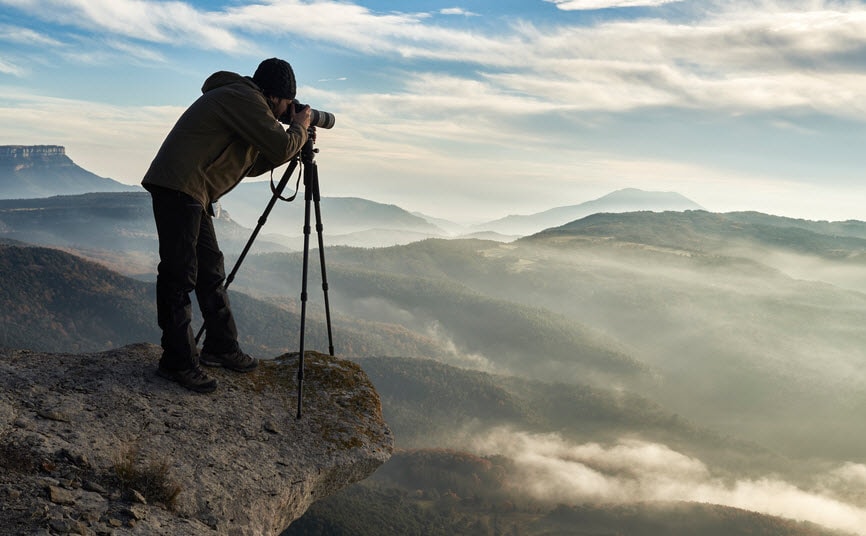Top Tax Deductions for Photographers
There are a lot of costs that come with running a photography business, but you can save when you file taxes by claiming write-offs. Tax deductions for photographers can include everything from studio costs to training, licenses, and more. Before you file your taxes, learn more about these photographer tax deductions to maximize your tax refund.
The One Big Beautiful Bill that passed includes permanently extending tax cuts from the Tax Cuts and Jobs Act, including increasing the cap on the amount of state and local or sales tax and property tax (SALT) that you can deduct, makes cuts to energy credits passed under the Inflation Reduction Act, makes changes to taxes on tips and overtime for certain workers, reforms Medicaid, increases the Debt ceiling, and reforms Pell Grants and student loans. Updates to this article are in process. Check our One Big Beautiful Bill article for more information.

Key Takeaways
- Capital expenses such as cameras, lenses, lighting, light boxes, filters, tripods, computers, and hard drives can be deducted over their useful life or all at once, if they qualify, using the Section 179 deduction.
- Costs associated with studio space such as electricity, phone, internet, and insurance usually can be deducted.
- Training, education, and licensing costs such as business association memberships, mentoring or coaching costs, and software licenses often can be deducted.
- Travel expenses such as mileage on your car, a portion of car insurance, auto repairs, maintenance, and even a portion of capital expenses like a new car purchase typically can be deducted.
Upfront Expenses: Cameras, Stands, Lights, and Props
Starting your own photography business may mean significant startup costs. Just creating a basic set can cost at least $10,000, and as you add in buying props and backdrops, you’re looking at a sizable investment. Thankfully, it’s an investment you can get a tax break on.
Equipment you’ll use for more than a year—including cameras, lenses, lighting, light boxes, filters, tripods, computers, and hard drives—counts as capital expenses.
- Each year you can deduct a portion of the cost of capital expenses over their useful life (a process called depreciation) and receive a small tax break each year.
- Or, if you qualify, you can deduct the upfront costs all at once using the Section 179 deduction, and you can get a significant tax break in your first year.
TurboTax guides you through the process to help you make the right decisions about depreciating vs. expensing.
Studio and Venue Costs
Running a photography business requires a lot of space—from the studios where you shoot to the storage space where you keep a library of props. You can deduct the cost of the venues used for your business. You can also deduct other costs associated with studio space that are used to maintain it, like electricity, phone, internet, and insurance.
Training, Education, and Licensing Costs
While post-secondary education entitles you to education tax credits, additional training that keeps you current in your existing career may also reduce the taxes you owe. For example, if you attend a weekend course on action photography, you typically can deduct tuition, travel, and lodging for attending the workshop as a business expense.
You can also deduct business expenses such as:
- business association memberships
- mentoring or coaching costs
- software licenses or trade magazine subscriptions
Travel Expenses
Driving to shoots can rack up mileage, especially if you service a large area, but you can likely get a tax break by deducting your business travel expenses. That includes mileage on your car, a portion of car insurance, auto repairs, maintenance, and even a portion of capital expenses like a new car purchase.
Airfare, train, and bus tickets can count as business expenses if you use them to travel to professional conferences, photo shoots, or training sessions.
TurboTax Tip:
Home office deductions such as rent, mortgage interest, renters or homeowner’s insurance, utilities, and possibly even renovations usually can be claimed.
Home Office Tax Deductions
If you’re storing props in your linen closet or basement, or if you've set up a home office for photo editing, you may be eligible for home office deductions. Generally, you’re eligible for deductions if you use some part of your home exclusively and as the principal place for your business—TurboTax will ask you a few questions to determine your eligibility.
If you’re able to deduct home office expenses, you can claim:
- rent
- mortgage interest
- renters or homeowners' insurance
- utilities
- and possibly even renovations
Deducting Business Expenses
Because photography can be a hobby as well as a profession, you’ll need to take steps to prove that you’re running a legitimate business in order to deduct business expenses. Register your business with local licensing agencies and set up bank accounts that remain separate from your personal accounts. And keep receipts for all business expenses you plan to claim as deductions should the IRS ask to see them later on.
Let a local tax expert matched to your unique situation get your taxes done 100% right with TurboTax Expert Full Service. Your expert will uncover industry-specific deductions for more tax breaks and file your taxes for you. Backed by our Full Service Guarantee.
You can also file taxes on your own with TurboTax Do It Yourself Premium. Searches 450+ tax deductions and credits so you get every dollar you deserve.
Get started now by logging into TurboTax and file with confidence.














